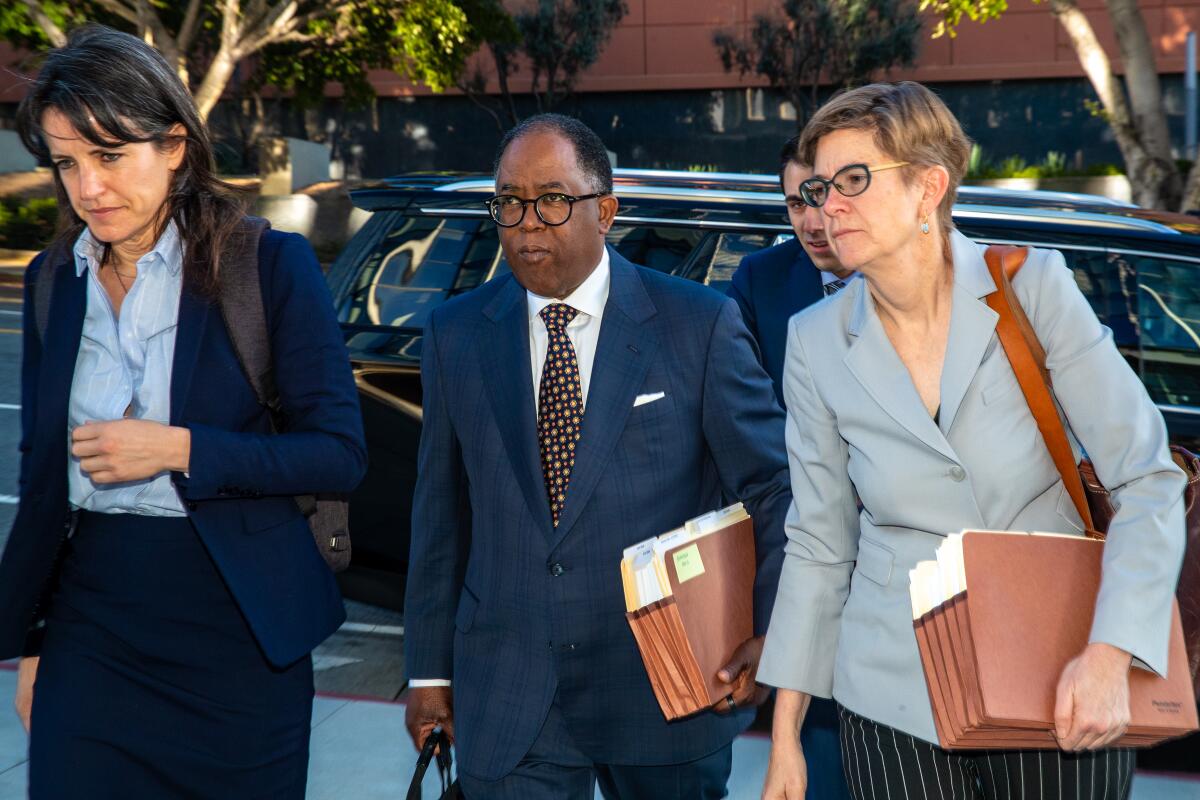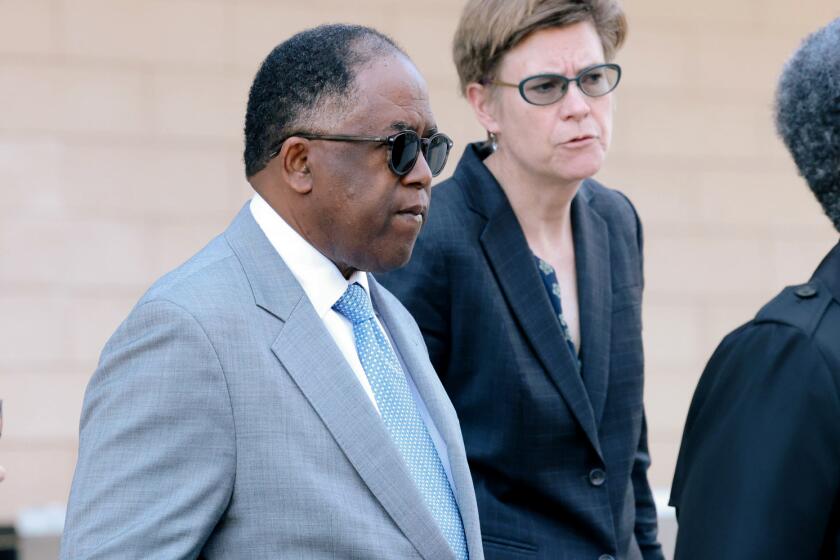Judge in Ridley-Thomas case weighs ordering new trial or tossing out jury verdict

- Share via
Lawyers for longtime Los Angeles politician Mark Ridley-Thomas, who was convicted of bribery, fraud and conspiracy, asked a federal judge Monday to set aside the jury’s guilty verdict and order a new trial or acquit their client outright.
Defense attorneys argued that prosecutorial misconduct, insufficient evidence and inaccurate and “improper testimony” by the lead FBI agent on the case warranted vacating the jury’s verdict.
“This is a case in which there is a miscarriage of justice,” defense attorney Daralyn Durie told U.S. District Judge Dale Fischer, eliciting murmurs of assent from more than 100 people packed into the seventh-floor courtroom. Among the crowd were lobbyists, former staffers, Ridley-Thomas’ wife and a public relations team assisting his defense.
Fischer did not rule on either of the two motions sought by Ridley-Thomas’ legal team — one for a new trial, the other asking for acquittal. “I will get out my decision as soon as I can,” the judge said at the end of the hourlong hearing.
Jurors convicted the former L.A. City Council member of four counts of honest services wire fraud and one count of honest services mail fraud related to his sending a $100,000 donation from a campaign fund to USC, knowing the university would then route the money to a nonprofit run by his son.
He was also convicted of one count each of bribery and conspiracy, which allege the $100,000 donation was part of a broader bribery scheme in which Ridley-Thomas, 68, extracted special benefits for his son from USC while voting in support of motions and a mental health contract sought by the university.
Veteran L.A. County politician Mark Ridley-Thomas is found guilty of federal corruption charges related to benefits his son received at USC.
His co-defendant, Marilyn Flynn, pleaded guilty to bribery last year and is scheduled to be sentenced this summer.
Ridley-Thomas is also scheduled to be sentenced this summer, barring the outcome of his legal team’s motions for a new trial and an acquittal.
Defense lawyer Galia Z. Amram summarized a litany of claimed legal defects in the trial, arguing first that there was scant evidence of Ridley-Thomas’ performing an “official act,” a requirement for the honest services fraud counts.
Although prosecutors alleged that Ridley-Thomas “voted” on extending a contract from L.A. County to USC for a remote mental health treatment program, Amram said there was no evidence of an actual vote. This item was approved on the Board of Supervisors’ “consent calendar,” in which several noncontroversial items are grouped together and passed as a batch.
“The FBI agent had limited information about what the consent calendar meant,” Amram said. The absence of evidence on this, she said, was insufficient to show the “official act.”
“They did not show that he raised his hand,” Amram said. “They did not show that he said ‘aye.’”
Get the lowdown on L.A. politics
Sign up for our L.A. City Hall newsletter to get weekly insights, scoops and analysis.
You may occasionally receive promotional content from the Los Angeles Times.
Amram claimed that prosecutors were offering a theory of omission — that Ridley-Thomas should have stopped a consent vote from happening and raised his hand. There was “no evidence that omission counts as an official act,” she said, and therefore, the honest services fraud convictions should be vacated.
But Assistant U.S. Atty. Lindsey Greer Dotson rejected the idea that the records of a 2018 Board of Supervisors meeting did not show an “official act,” calling a vote during a public meeting “the clearest, most dispositive official act.”
“Defense counsel can argue that a vote isn’t a vote,” Dotson said. She said that separately, the evidence indicated “there was agreement to perform an official act,” which warranted upholding the guilty verdict.
Dotson said that “there is no error here” in her argument against a new trial, adding that “99%” of what defense attorneys claimed were errors were never objected to during trial.
“These are forfeited errors,” Dotson said.
More to Read
Sign up for Essential California
The most important California stories and recommendations in your inbox every morning.
You may occasionally receive promotional content from the Los Angeles Times.












